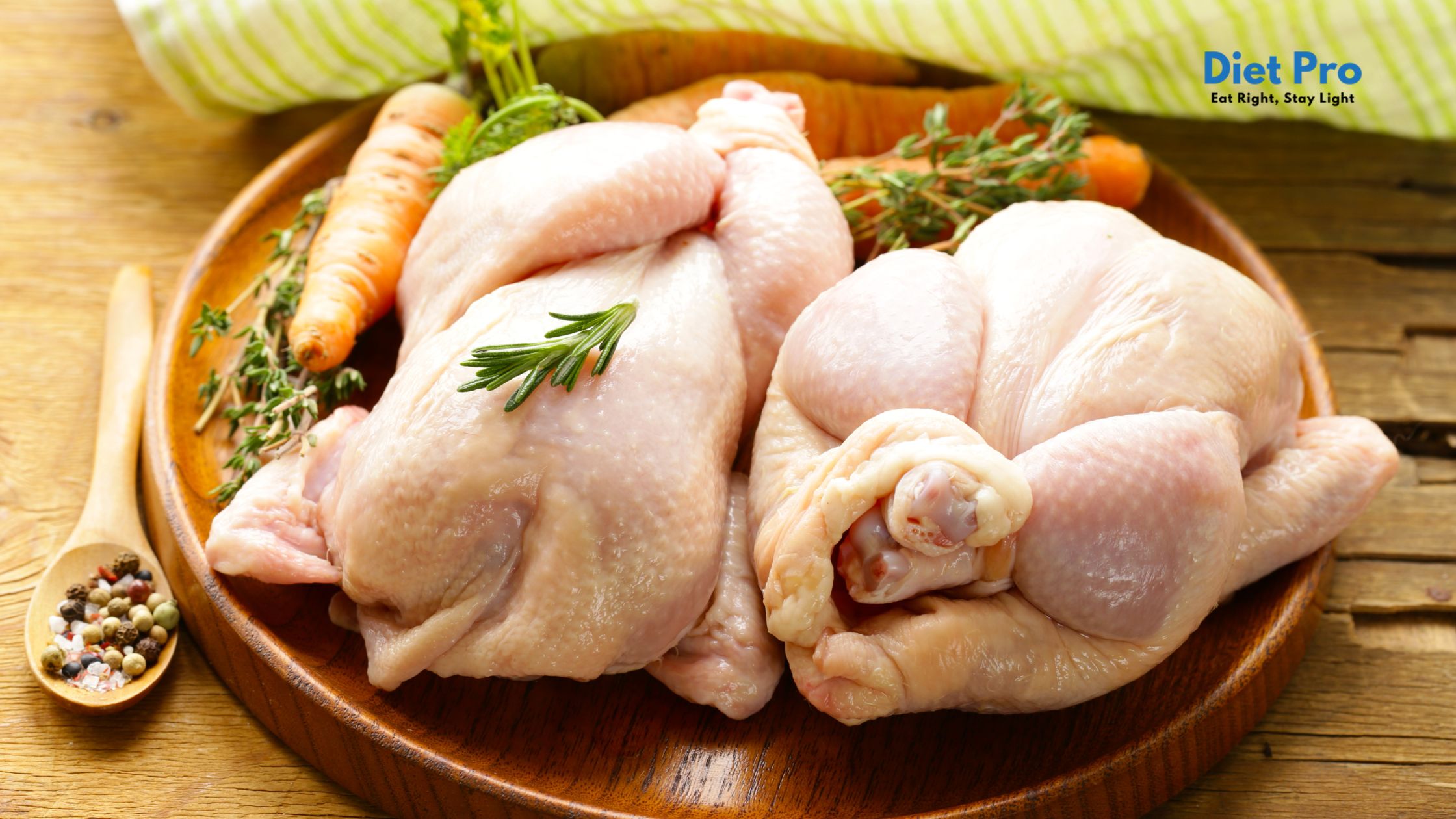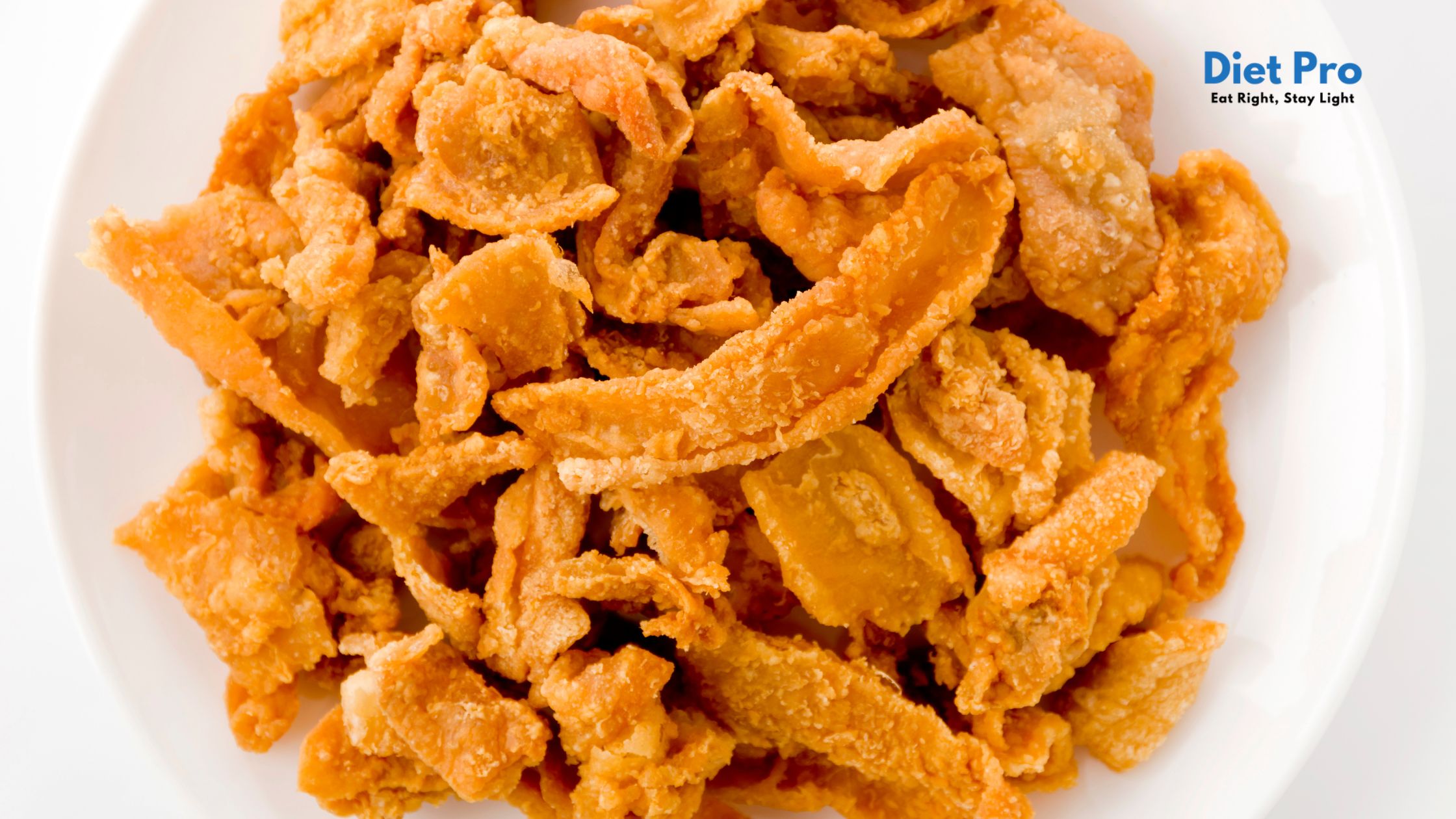Chicken is a popular and versatile protein source that graces dinner tables worldwide in various forms. When it comes to chicken, some people relish the succulent meat, while others are equally tempted by the crispy and flavorful chicken skin. However, the debate surrounding whether chicken skin should be eaten or discarded is a common one. In this blog, we will delve into the facts about Chicken Skin Nutrition, the potential benefits, and the considerations to make an informed decision about including it in your diet.
What is Chicken Skin?
Chicken skin is the outer layer covering the meat of the bird. It is composed mainly of fat, connective tissue, and the protein collagen. When cooked, the skin becomes crispy and is often regarded as a delicious treat.
Facts Chicken Skin Nutrition:
- Calories: Chicken skin is calorie-dense, contributing to a significant portion of the overall calorie content of the meat. Approximately, a 3.5-ounce (100g) serving of roasted chicken skin provides around 400-450 calories.
- Fat: The majority of chicken skin’s composition is fat. While the exact fat content can vary depending on the cooking method and chicken breed, it typically contains both saturated and unsaturated fats. Saturated fat may contribute to raising LDL cholesterol levels, so moderation is advised.
- Protein: Chicken skin contains a small amount of protein, but it is relatively low compared to the meat itself.
- Collagen: The connective tissue in chicken skin is a source of collagen, a protein that supports skin, hair, joint, and bone health.
Potential Benefits of Chicken Skin:
- Flavor and Texture: The crispy and flavorful nature of chicken skin can enhance the overall dining experience, making the meal more enjoyable.
- Collagen Content: The collagen found in chicken skin can provide benefits for skin health, joint health, and may aid in supporting bone density.
Considerations and Moderation:
While chicken skin can be a delectable treat, it’s essential to be mindful of its nutritional profile and make informed choices: Chicken Skin Nutrition
- High Caloric Content: Chicken skin is calorie-dense, so consuming it in excess may contribute to weight gain if not balanced with a healthy diet and active lifestyle.
- Saturated Fat: The saturated fat in chicken skin can have adverse effects on cholesterol levels if consumed excessively. Individuals with heart health concerns should exercise caution and consume it in moderation.
- Cooking Method: The cooking method used can significantly impact the nutritional content of chicken skin. Roasting or grilling chicken with the skin on allows excess fat to drip off, making it a healthier choice compared to deep-frying.
- Personal Health Considerations: Individuals with specific health conditions, such as heart disease or high cholesterol, should consult with a healthcare professional or a registered dietitian to determine whether including chicken skin aligns with their dietary needs.
Fat Content in chicken skin
Chicken skin is known for its delicious crispiness and flavorful taste, making it a tempting addition to many dishes. However, it is essential to be aware of its fat content. Chicken skin is predominantly composed of fat, and a significant portion of the calories it provides come from fats. The fat in chicken skin includes both saturated and unsaturated fats, with saturated fats being the predominant type. While unsaturated fats are considered healthier for the heart, excessive consumption of saturated fats can raise LDL cholesterol levels, which may increase the risk of heart disease.
Therefore, moderation is crucial when enjoying chicken skin to maintain a balanced and healthy diet. Additionally, choosing healthier cooking methods, such as roasting or grilling, can help reduce fat retention in chicken skin. Being mindful of portion sizes and incorporating a variety of other nutrient-rich foods can further support a well-rounded nutritional intake while indulging in the occasional delight of crispy chicken skin.

Delicious Recipe For Crispy Chicken Skin
Whether you’re preparing a snack for yourself or want to impress your guests with a unique appetizer, this simple and mouthwatering recipe will surely become a favorite. Get ready to indulge in a delightful blend of flavors and textures as we uncover the secret to achieving perfectly crispy chicken skin that will leave you wanting more. (Chicken Skin Nutrition)
Ingredients:
- Chicken skin (from 2-3 chicken pieces)
- 1 tablespoon olive oil or melted butter
- 1 teaspoon paprika
- 1/2 teaspoon garlic powder
- 1/2 teaspoon onion powder
- 1/2 teaspoon dried thyme
- Salt and pepper to taste
Instructions:
- Prepare the Chicken Skin:
- Gently remove the skin from 2-3 chicken pieces, such as drumsticks or thighs. Pat the skin dry using paper towels to remove excess moisture.
- Seasoning Mix:
- In a small bowl, combine the olive oil or melted butter with paprika, garlic powder, onion powder, dried thyme, salt, and pepper. Mix well to create a flavorful seasoning blend.
- Preheat the Oven:
- Preheat your oven to 375°F (190°C). Line a baking sheet with parchment paper for easy cleanup.
- Season the Chicken Skin:
- Using a brush or your fingers, evenly coat both sides of the chicken skin with the seasoning mix. Make sure to rub the seasoning into the skin for maximum flavor.
- Arrange on the Baking Sheet:
- Place the seasoned chicken skin in a single layer on the prepared baking sheet, ensuring they don’t overlap. This will help achieve crispy results.
- Bake to Perfection:
- Bake the chicken skin in the preheated oven for about 20-25 minutes or until it turns golden brown and becomes crispy. Keep a close eye on them in the final minutes to prevent burning.
- Drain and Serve:
- Once the chicken skin is beautifully crispy, remove them from the oven and transfer to a plate lined with paper towels to absorb any excess oil.
- Enjoy the Crispy Delight:
- Serve the crispy chicken skin immediately while it’s still warm and irresistibly crunchy. They can be enjoyed as a flavorful appetizer or served alongside your favorite dipping sauce.
Tips:
- Experiment with different seasoning blends like BBQ, Cajun, or lemon-pepper for a variety of flavors.
- For an even crispier texture, you can place a wire rack on top of the baking sheet and arrange the seasoned chicken skin on it before baking.

- Read More :- Methi Malai Chicken
- Read More :- Benefits of Kulekhara Leaves
- Read More :- Green Smoothie Recipes
Conclusion:
Chicken skin is a flavorful delight that can elevate the dining experience, but it comes with a nutritional caveat. While it contains protein and collagen, it is also calorie-dense and rich in saturated fat. Enjoying chicken skin in moderation, alongside a balanced and nutrient-rich diet, can be a part of a healthy lifestyle. Ultimately, Chicken Skin Nutrition individual health goals, dietary preferences, and medical considerations should guide your decision on whether to indulge in this crispy treat. As with any dietary choice, balance and informed decisions are key to enjoying chicken skin as a delectable addition to your meals.
